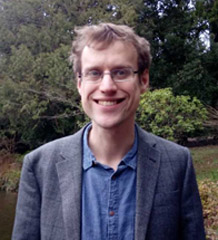Project Lead
Dr David Parry
David’s research and teaching focuses primarily on the sixteenth and seventeenth centuries, especially the work of John Milton and other Puritan writers, though he has also published on twentieth-century writers and has taught texts from antiquity to the twenty-first century. He has broad research interests that cluster around the intersection of literature, rhetoric, religion and intellectual history.
He enjoys using creative methods in his teaching alongside more traditional modes of lecture and seminar teaching, a interest which has birthed the Early Modern Dialogues in Performance project. His hope for the project is that it will bring this texts to life and make them accessible both to students and the wider community.

Departments
Centre for Early Moden Studies
Established in 2007, the Centre for Early Modern Studies capitalises on the exceptional concentration of scholars of the early modern era based at the University of Exeter. Formally located within the College of Humanities, it provides a focus for intellectual exchange and interdisciplinary activity between academic staff and postgraduate students in History, English, Drama, Modern Languages and Cultures and Art History and Visual Culture.
Led by the Co-Directors Dr Freyja Cox Jensen (History), Dr Felicity Henderson (English), Dr James Fisher (History), Dr Laura Sangha (History) and Dr Helena Taylor (Modern Languages) Centre staff are engaged in research on all aspects of the period between c.1500 and 1800. Expertise ranges from Britain and Europe to the Middle East and North America. Key areas of activity include: religious culture; social and economic relations; political and intellectual thought; gender and sexuality; space, landscape and national identities; the history of the book; and theatre and performance.
The Digital Humanities Lab
The University of Exeter’s Digital Humanities Lab is a network of staff, students and external partners dedicated to critically and creatively enhancing humanities research and teaching through digital methods. Their approach combines both practical and theoretical approaches, with a focus on innovation at the heart of both. They believe the Digital Humanities to be an inherently interdisciplinary, collaborative field, that depends on a working environment that is diverse, inclusive, and self-reflective. The scope of Digital Humanities is far broader than any one institution can encompass, and we therefore specialise in a range of topics that specifically relate to the University’s research strengths as they evolve.
As part of this mission, their team of interns are providing the technical support for the project. Whether this is through filming the dialogues, editing the videos or designing the website, the DH team are passionate about using their technical skills to innovate the way we study the Humanities and help intrigue new audiences .
Project Enhance
Project Enhance supports the collective creation of our Digitally Enhanced and Flexible Portfolio, embracing all of our taught degree programmes. This will be essential for the University in academic year 2020/21 and will enhance the learning experience of on-campus and remote learners in 2020/21 and for years to come.
The creation of resources for Early Modern Dialogues in Perfomance project is partly funded by Project Enhance so that they can be used as innovative teaching aids, both this year and beyond.

